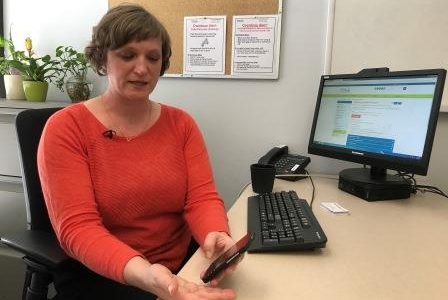Put VCH’s new overdose alert system on your RADAR
“With 253 people having died in the VCH region from illegal drug overdoses last year,” said Sara Young, Regional Leader, Mental Health & Substance Use, who was formerly the Project Coordinator. “We desperately need to find a better way to quickly get messages out about bad batches of drugs so that people can take added precautions, and prevent overdosing.”
VCH Harm Reduction and BC Centre for Disease Control (BCCDC) staff launched the Real-time Drug Alert & Response (RADAR) system this week. Anyone in the VCH region, such as people who use illegal substances and frontline health care staff, can anonymously report overdoses that show unusual symptoms. This info will be relayed to Harm Reduction staff immediately and they in turn will send out a warning about contaminated drugs.
Rebecca Thomas, former Research Assistant for the project and now Project Coordinator, says, “This new system can help frontline staff anticipate bad batches of drugs, and the side effects (eg. difficult overdose presentations). It can also allow staff to warn their clients about the dangers of the specific drug.”
In the video below, Sarah Young demonstrates how to enter information via the new texting service.
New system is in real time
Currently, data from several sources, such as BC Emergency Health Services, emergency departments, Insite, and overdose prevention sites, is analyzed to find any anomalies in overdoses, which could signal a contaminated batch of drugs on the street. The information is then forwarded to harm reduction service providers to communicate to people who use drugs but these alerts often lag one to two weeks behind the data. This new service will allow the alerts to get out the same or next day.
Report bad dope
Text “bad dope” to (236) 999-DOPE (3673) or fill in the form at www.vch.ca/overdose.
Get drug contamination alerts
If you’d like to receive drug contamination alerts, text “alert” to (236) 999-DOPE (3673).
Project Concept
“I came up with the idea for this project a few years ago, and it took a lot of work and time to get it to this stage,” says Sara. “With support from our medical health officers, and Dr. Jane Buxton at the BCCDC, we were able to secure VCHRI funding, which made the project possible. Doing the background research and focus groups with people who use drugs and frontline services providers was the fun and easy part, but navigating privacy and technology issues was complicated and really slowed the project down!”
The research project is funded by the Vancouver Coastal Health Research Institute. After eight months the project will be evaluated to determine possible future use.
More info
For details about this read the news release.
For more info about the overdose crisis including where to get a naloxone kit visit www.vch.ca/overdose.


Gerry
I love this idea. As with Sarah’s question, if there is a poster for this campaign, can it be uploaded as a .pdf document. I would like to display this information at a post-secondary institution for my students.
Tiffany Akins
We have some hard copies of posters we can send to you. We’ll be in touch via email.
Sarah
This is great. Is there a poster being used to communicate to people using substances? I would love to put one up at our site. Thanks.
Tiffany Akins
We have some hard copies of posters we can send to you. We’ll be in touch via email.